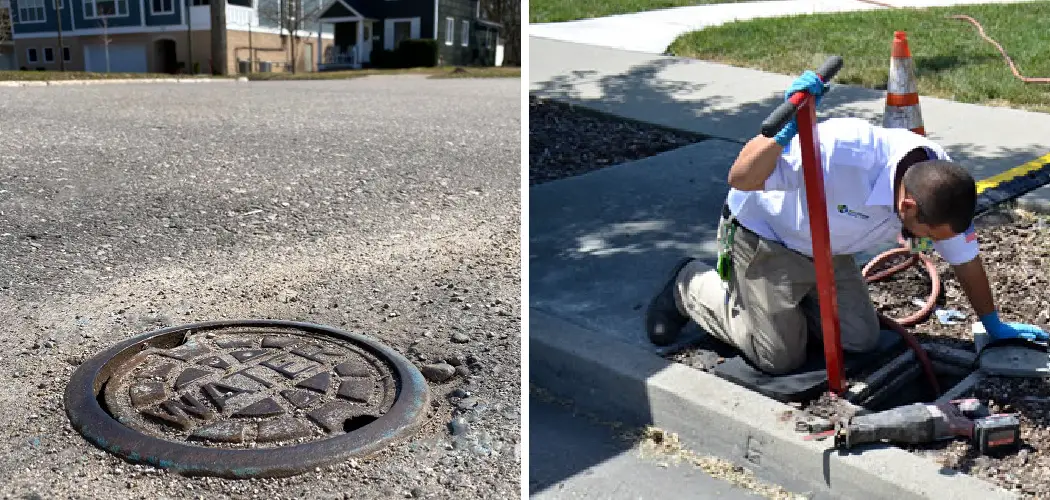Do you own a home or other kind of property? If so, knowing how to shut the water off on the street is essential. Whether you need to turn off the water for repairs or prevent freezing pipes in winter, learning this valuable skill can help keep your home safe and secure. Understanding how to shut off water on the street is essential for protecting your house from potential disasters and doing basic DIY repairs.

In this blog post, we’ll closely examine why shutting water off on the street is so important, as well as step-by-step instructions on how to do it safely and effectively. Read on to learn everything you need to know about how to shut water off at the street, prevent flooding, and avoid costly damage caused by frozen pipes!
Necessary Items
Before getting started, you will need to have a few items ready. These include:
- A pair of pliers or a shut-off valve key: This is used to grip and turn the valve handle.
- Protective gloves: To prevent any injuries while handling the pliers or key.
- Flashlight (if needed): Ensure proper lighting if your water meter is in a dark area.
- A wrench (if needed): Some shut-off valves may require a wrench to turn them.
Why Shutting Water Off on the Street is Important
Shutting water off on the street is essential for various reasons:
1. Emergency Situations
In case of an emergency, such as broken pipes or overflowing toilets, knowing how to shut off water on the street can prevent severe damage to your home. You can stop further flooding and minimize potentially costly repairs by shutting off the water quickly.
2. DIY Repairs
If you plan on doing any plumbing repairs yourself, shutting off the water on the street first is essential. This will prevent any unexpected bursts of water or accidental flooding while working on the pipes.
3. Frozen Pipes
In colder climates, water can freeze in pipes, causing them to burst and potentially cause damage to your home. You can prevent this issue by shutting off the water on the street and draining the remaining water from the pipes.
10 Steps on How to Shut Water Off at the Street
Follow these steps to safely and effectively shut off the water on the street:
Step 1: Locate Your Water Meter
The water meter is usually located at the front of your property near the road. It may be covered by a small lid or set on the ground with a cover. For more clarification, consult a property map with your local water department.
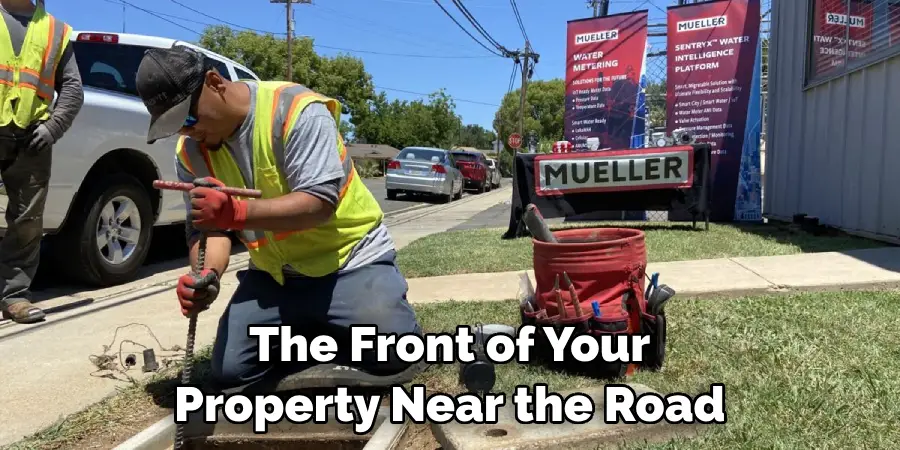
Step 2: Gather Necessary Items
Ensure you have all the items listed above before proceeding to the next step. This will save time and make the process smoother.
Step 3: Identify the Shut Off Valve
Once you have located your water meter, look for a valve near it. It may be a round or square knob, depending on the type of shut-off valve installed. Contact your local water department for assistance if you need help locating the valve.
Step 4: Turn Off Any Appliances Using Water
Before shutting off the main water valve, turn off any water appliances, such as washing machines or dishwashers. This will prevent any damage to these appliances without a water supply.
Step 5: Put on Protective Gloves
To prevent any injuries, wear protective gloves before handling the pliers or valve key. This will also help you get a better grip on the valve.
Step 6: Use Pliers or Valve Key to Turn Off the Valve
If your shut-off valve has a square knob, use the pliers to grip and turn it clockwise. If it has a round knob, use the valve key to turn it in the same direction. This will shut off the main water supply to your property.

Step 7: Check for Any Leaks
After turning off the valve, check for any leaks in the area. If you notice any, contact a professional plumber for assistance.
Step 8: Drain Remaining Water
To prevent any potential damage from frozen pipes, it is essential to drain the remaining water from your plumbing system. You can do this by turning on all faucets and flushing all toilets until the water stops running.
Step 9: Make Necessary Repairs or Call a Professional
If you were shutting off the water for repairs, proceed with your repairs. If not, you can turn the water back on by repeating steps 6 and 7 in reverse order. If you cannot complete any necessary repairs yourself, calling a professional for assistance is essential.
Step 10: Turn the Water Back On
Once all necessary repairs have been made or if you were simply shutting off the water as a precaution, turn the valve back on by repeating step 6 in reverse. Check for any leaks again and ensure all appliances are functioning correctly.
Knowing how to shut water off at the street is an essential skill for any homeowner or property owner. In emergencies, it can prevent costly damage to your home while also being a necessary step before any DIY plumbing repairs.
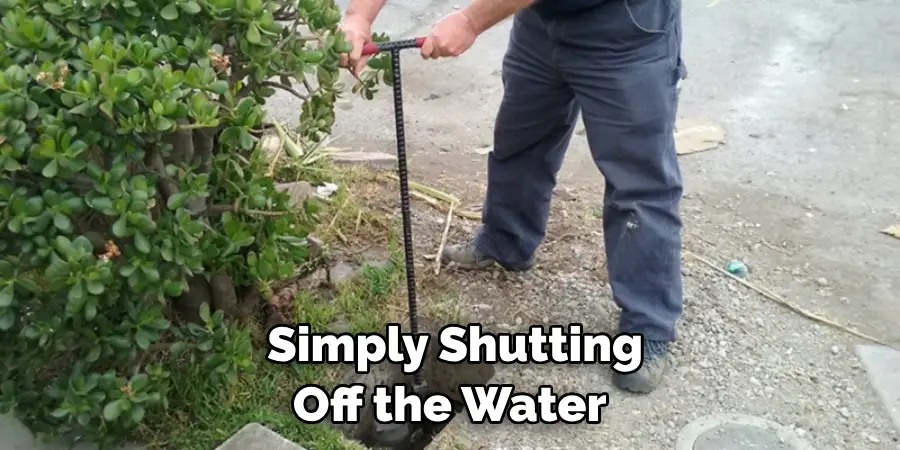
By following these steps, you can safely and effectively shut off the water on the street and protect your home from potential disasters. Remember always to be cautious and consult a professional if needed. Stay safe and responsible as a property owner by being prepared for any situation that may arise with your main water supply.
8 Things to Avoid While Shutting Water Off at the Street
While it is essential to know how to shut off water on the street, there are certain things you should avoid during this process:
1. Using Excessive Force
If you encounter resistance when turning the valve, do not use excessive force, which can damage the valve and cause further issues. Instead, try using a wrench or contact a professional for assistance.
2. Leaving Appliances Running
Before shutting off the main water valve, turn off any water appliances, such as washing machines or dishwashers. This will prevent damage to these appliances and help drain the remaining water from the system.
3. Forgetting to Drain Remaining Water
After shutting off the valve, drain the remaining water from your plumbing system to prevent potential damage from frozen pipes.
4. Not Wearing Protective Gear
Always wear protective gloves when handling the pliers or valve key to prevent injuries and get a better grip on the valve.
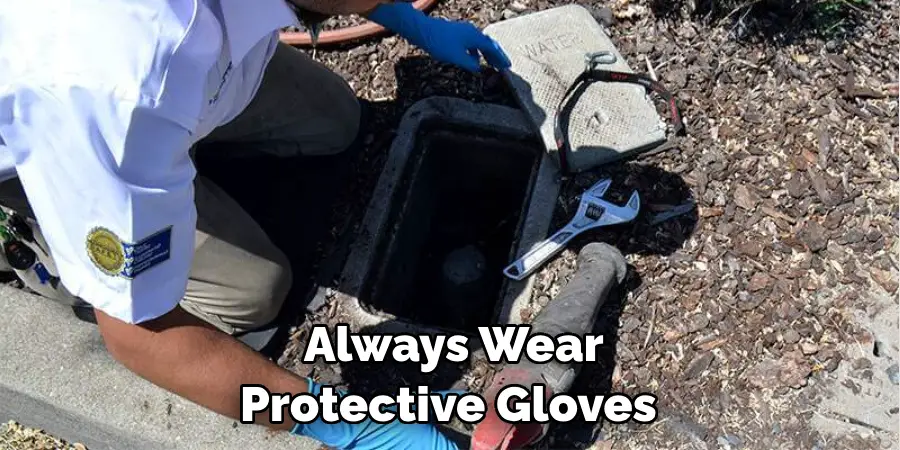
5. Ignoring Leaks
If you notice any leaks after shutting off the valve, do not ignore them. Contact a professional plumber for assistance to prevent further damage.
6. Attempting Repairs Without Proper Knowledge or Experience
If you plan on making DIY repairs, ensure you have proper knowledge and experience before attempting them. Otherwise, it is best to call a professional for help.
7. Turning Water Back On Before Completing Repairs
If you were shutting off the water for repairs, complete them before turning it back on. Otherwise, it can cause additional damage and potentially lead to costly repairs.
8. Not Checking Appliance Functionality
After completing all necessary steps and turning the water back on, ensure all appliances are functioning correctly. If not, turn the water back off and contact a professional.
So remember to follow these steps carefully and avoid these common mistakes while shutting off water at the street. Stay informed and responsible as a property owner by preparing for water-related emergencies. Keep this guide handy for reference in case of any urgent situations that may arise. With proper knowledge and preparation, you can prevent potential disasters and safeguard your home. So be proactive and stay informed as a responsible property owner!
Frequently Asked Questions
How Do I Find the Shut Off Valve on the Street?
The shut-off valve is typically located near your water meter and maybe a round or square knob. Contact your local water department for assistance if you are still looking for it.
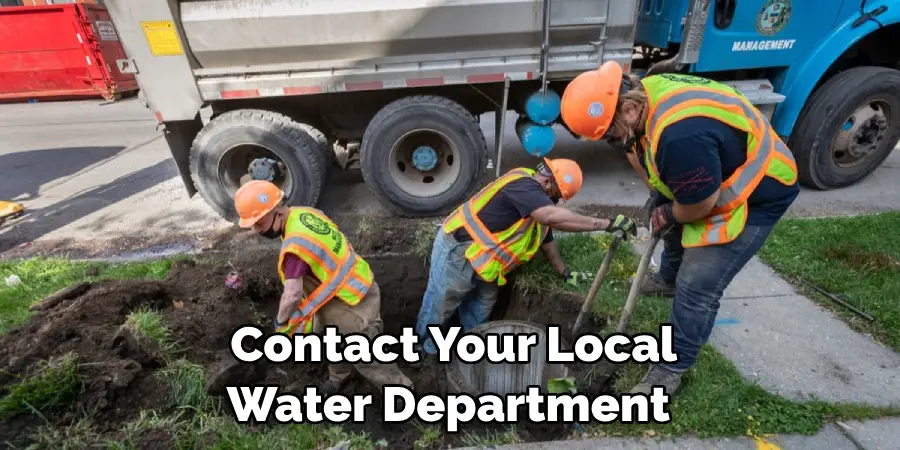
How Do I Turn Off the Shut Off Valve?
Using pliers or a valve key, turn the knob clockwise to shut off the main water supply. Remember to wear protective gloves and avoid using excessive force.
Why Should I Drain the Remaining Water from My Plumbing System?
Draining remaining water helps prevent potential damage from frozen pipes during colder months. Turn off all faucets and flush all toilets until the water stops running.
Can I Turn the Water Back On Before Completing Repairs?
No, completing any necessary repairs before turning the water back on is essential to prevent further damage. Otherwise, contact a professional for help.
Should I Check for Leaks After Turning Off the Valve?
Yes, checking for any leaks after turning off the valve is essential. If you notice any, contact a professional plumber for assistance. Remember always to be cautious and seek professional help if needed.
What is the Best Type of Water Shut-off Valve?
The best type of water shut-off valve will depend on your specific needs and preferences. Some popular options include ball valves, gate valves, and butterfly valves. It is best to consult a professional plumber for the most suitable type of valve for your home. Remember always to be cautious and seek professional help if needed.
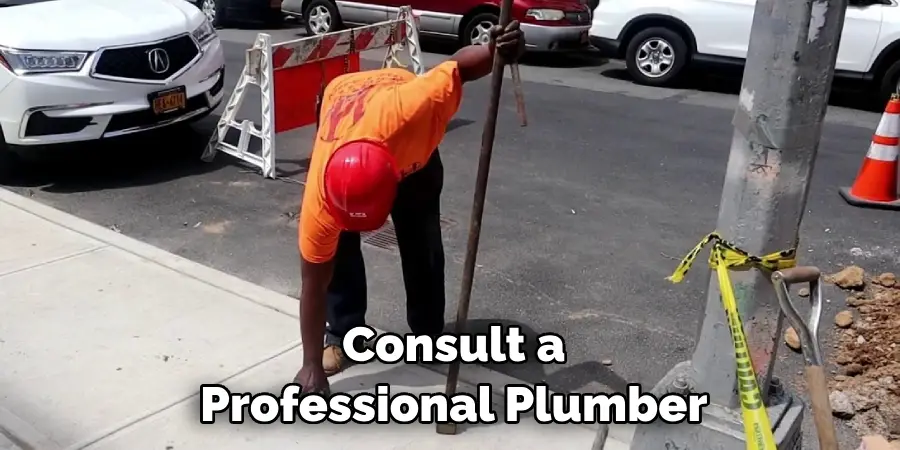
Can I Shut Off the Water on the Street for Maintenance Purposes?
Yes, shutting off water on the street is necessary before any maintenance or repairs on your plumbing system. It can prevent potential disasters and keep your home safe from water-related damage. Always remember to be cautious and consult a professional if needed.
Is It Safe to Attempt DIY Repairs?
Only attempt DIY repairs if you have proper knowledge and experience in plumbing. Otherwise, it is best to call a professional for help.
Conclusion
Knowing how to shut off water on the street is an essential skill for any property owner. By following the necessary steps on how to shut water off at the street and avoiding common mistakes, you can safely and effectively shut off the main water supply to your home in emergencies or before making necessary plumbing repairs. Always be cautious, wear protective gear, and consult a professional.
Stay informed and prepared as a responsible property owner by knowing how to handle potential water emergencies. Stay safe and take care of your property to avoid any costly damages in the future. So be responsible and take the necessary steps to protect your home’s water supply.
Keep this guide handy for reference in case of any urgent situations that may arise. With proper knowledge and preparation, you can prevent potential disasters and safeguard your home. So stay informed and proactive as a property owner!

